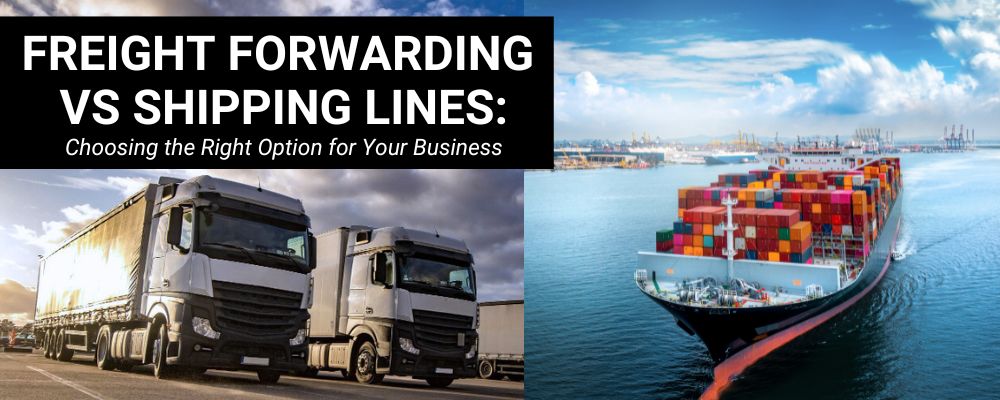
In today’s globalized world, businesses rely heavily on efficient and reliable transportation of goods from one location to another. This is where freight forwarding and shipping lines come into play. Understanding the difference between these two options is crucial for making informed decisions that align with your business needs. In this article, we will delve deeper into what freight forwarding entails, who a freight forwarder is, and explore the pros and cons of both options to help you make an informed choice.
Understanding Freight Forwarding
Freight forwarding refers to a service that helps companies safely transport their goods from one location to another in an efficient manner. Acting as middlemen between sellers and buyers, freight forwarders ensure that goods are shipped securely while considering cost-effectiveness. These entities offer a wide range of services encompassing five key steps:
1. Transportation: Freight forwarders select the most efficient route and mode of transportation such as sea, air or truck after negotiating rates with carriers.
2. Documentation: Creating invoices, bills of lading, customs documents, etc., falls under the responsibility of freight forwarders.
3. Storage & Warehousing: Goods are stored until they are ready to be shipped while ensuring proper handling, packaging, and tracking.
4. Insurance Coverage: Freight forwarders arrange appropriate insurance coverage in case of damage or loss during transit.
5. Customs Clearance: By providing necessary documentation like customs declarations and certificates of origin; freight forwarders assist shippers in clearing their goods through customs.
Who Are Freight Forwarders?
Freight forwarders can either be individuals or companies specializing in transportation logistics with extensive knowledge about different modes of transportations (sea/air/truck) as well as routes & regulations worldwide. They possess expertise regarding various aspects including customs procedures & regulations along with licensing requirements mandated by governing bodies.
Freight forwarders are often licensed and insured to ensure optimal services for their customers. They collaborate with carriers, customs brokers, and other service providers to guarantee timely delivery of goods in a cost-effective manner.
Introducing Shipping Lines
Shipping lines are companies that own and operate vessels used for transporting goods from one port to another. Unlike freight forwarders who act as intermediaries between shippers and carriers, shipping lines directly handle the entire transportation process including loading/unloading cargo and associated activities.
Pros and Cons of Freight Forwarders:
Using a freight forwarder has several advantages. Firstly, they possess extensive experience dealing with international trade regulations, customs clearance procedures, and related paperwork. Additionally, they have established relationships with various carriers that may help reduce shipping costs. However, freight forwarding services can be expensive compared to working directly with shipping lines; moreover, they might not always provide the most efficient or reliable service.
Pros and Cons of Shipping Lines:
Choosing a shipping line grants businesses control over the entire transportation process. Handling all aspects from cargo loading/unloading to associated activities provides more direct oversight. Furthermore, shipping lines typically offer their insurance policies for added protection during transit. However, this option tends to be costly relative to using a freight forwarder alone; also keep in mind that efficiency levels can vary among different shipping lines.
Factors To Consider When Choosing Between Freight Forwarding & Shipping Lines:
1. Type of Goods: The nature of your goods plays a crucial role in determining whether you should opt for freight forwarding or work directly with a specific shipping line.
2. Cost Analysis: Analyze the costs associated with both options thoroughly while considering your business’s financial capabilities.
3.Speed & Delivery Requirements: Evaluate how quickly you need your goods delivered – some options may offer faster transit times than others.
4.Customer Service Level: Assess the level of customer support offered by each option as it affects communication channels throughout the shipment process.
5.Flexibility: Consider the overall flexibility of the service in terms of accommodating your unique business requirements.
6.Reliability & Security: Ensure that the option you choose is reliable and secure. It is important to prioritize reliability and security factors while making a decision.








